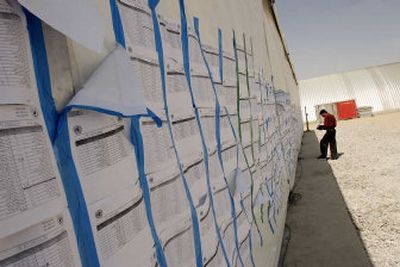Critic of Afghan warlords winner of parliament seat

KABUL, Afghanistan – A 27-year-old woman who is a defiant critic of Afghanistan’s powerful warlords won one of the first seats declared Thursday in provisional results from landmark parliamentary elections, a key step in the nation’s transition to democracy.
The U.N.-Afghan election body reported “serious” cases of fraud, including ballot-box stuffing after election day. It excluded 299 polling stations from the vote count, but declared the Sept. 18 poll was still credible.
President Hamid Karzai and NATO’s chief diplomat, meanwhile, expressed confidence that a planned deployment of 6,000 NATO troops into volatile southern provinces would happen next year – a move that could eventually free up thousands of American forces.
Some NATO members, including France and Germany, are reluctant for the peacekeeping force, currently deployed in the more stable north and west, to become embroiled in counterinsurgency operations against Taliban-led rebels in the south, currently handled by a separate U.S.-led coalition. They also object to plans to put both missions under NATO command.
On a trip to the southern city of Kandahar after meeting Karzai, NATO Secretary-General Jaap de Hoop Scheffer said he expected the alliance to resolve the issues “by November, certainly by the end of the year.”
In Kabul, the election body declared unofficial winners for national and provincial assembly seats in two of the country’s 34 provinces, Farah and Nimroz, and said most of the other results would be released in the coming week.
Final, certified results are expected by late October after what officials predict will be a frenetic complaints period.
“I’m very happy and thankful for Afghan men and women who voted for me,” said Malalai Joya, a women’s rights worker from Farah, who won one of her province’s five seats in the 249-seat Wolesi Jirga, or National Assembly.
“My first priority when I go to parliament will be peace, security and stability, and to collect all the guns from warlords,” she told the Associated Press.
Joya rose to prominence after daring to denounce powerful warlords at a post-Taliban constitutional convention two years ago. Despite concerted U.N.-backed efforts to disarm militia leaders, they remain a dominant force in much of Afghanistan.
It is hoped that democratic elections will be a major step toward stability and rule of law after two decades of conflict and the ouster of the Taliban in a U.S.-led war in late 2001. A quarter of parliamentary seats are reserved for women in a bid to adjust the heavily patriarchal slant of Afghan politics.
According to partial results displayed on the official election Web site, the top-ranking candidates in most provinces are warlords or leaders of mujahedeen factions.
Electoral law bars anyone with links to armed groups from competing, but many of the most influential candidates slipped through a U.N.-backed review of who was on the ballot – a process human rights activists described as woefully inadequate.